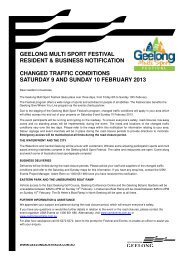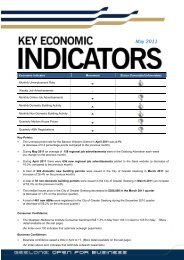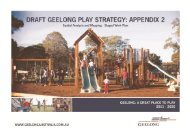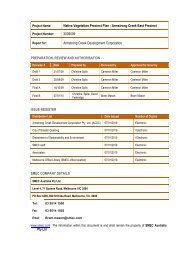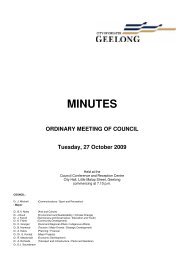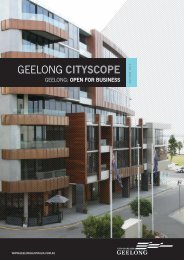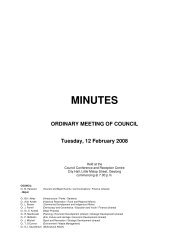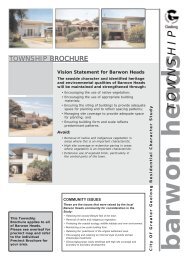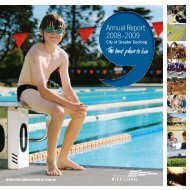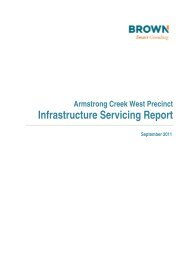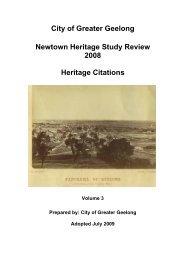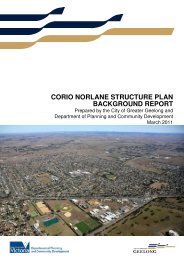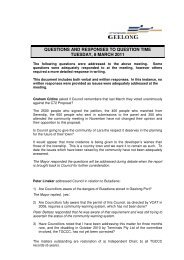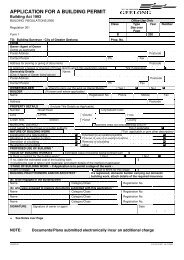Multicultural Action Plan (PDF - 2.5MB) - City of Greater Geelong
Multicultural Action Plan (PDF - 2.5MB) - City of Greater Geelong
Multicultural Action Plan (PDF - 2.5MB) - City of Greater Geelong
Create successful ePaper yourself
Turn your PDF publications into a flip-book with our unique Google optimized e-Paper software.
36<br />
Appendices<br />
Access<br />
Access refers to the services being available to<br />
everyone who is entitled to them and should be<br />
free <strong>of</strong> any form <strong>of</strong> discrimination, irrespective <strong>of</strong><br />
the person’s country <strong>of</strong> birth, language, culture,<br />
race or religion.<br />
Assimilation<br />
As opposed to multiculturalism, assimilation<br />
refers to the expectation whereby minority<br />
groups are expected to give up their distinctive<br />
linguistic, cultural and social characteristics and<br />
become indistinguishable from the majority <strong>of</strong> the<br />
population.<br />
Asylum Seekers<br />
Asylum seekers are people who have applied for<br />
protection and are waiting for a determination<br />
<strong>of</strong> their status. They seek refugee status<br />
after arrival in Australia. Many <strong>of</strong> them enter<br />
Australia as students or visitors and some arrive<br />
unauthorised. However, not all asylum seekers will<br />
be given refugee status.<br />
(Source: Refugee Council <strong>of</strong> Australia)<br />
Culture<br />
Any patterned set <strong>of</strong> behaviours, knowledge,<br />
values, beliefs, experiences and traditions shared<br />
by a particular group <strong>of</strong> people.<br />
(Source: Institute for Cultural Partnerships)<br />
◊ http://www.culturalpartnerships.org/<br />
pruductspubs/glossary.asp.<br />
CITy OF GREATER GEELOnG<br />
Cultural Diversity<br />
Culture: The United Nations: Article 1 <strong>of</strong> the<br />
Universal Declaration on Cultural Diversity<br />
Identity, Diversity and Pluralism identifies,<br />
“cultural diversity: the common heritage <strong>of</strong><br />
humanity.” Culture takes diverse forms across<br />
time and space. This diversity is embodied in the<br />
uniqueness and plurality <strong>of</strong> the identities <strong>of</strong> the<br />
groups and societies making up humankind. As<br />
a source <strong>of</strong> exchange, innovation and creativity,<br />
cultural diversity is as necessary for humankind<br />
as biodiversity is for nature. In this sense, it is the<br />
common heritage <strong>of</strong> humanity and should be<br />
recognised and affirmed for the benefit <strong>of</strong> present<br />
and future generations.”<br />
Cultural Group<br />
Individuals who share a common culture,<br />
including certain behaviours, knowledge, values,<br />
skills assumptions and expectations.<br />
(Source: Institute for Cultural Partnerships):<br />
◊ http://www.culturalpartnerships.org/<br />
pruductspubs/glossary.asp.<br />
Culturally and Linguistically Diverse (CALD)<br />
There are differing views as to what constitutes<br />
a CALD background. The distinguishing features<br />
include, but are not limited to:<br />
• Country <strong>of</strong> origin<br />
• Languages spoken at home<br />
• Family ties<br />
• Cultural and religious background<br />
• Self identification<br />
Equity<br />
The term emphasises fairness in process and<br />
outcome, such as equal access to government<br />
services, which should be developed and<br />
delivered on the basis <strong>of</strong> fair treatment <strong>of</strong> clients<br />
who are eligible to receive them. The term also<br />
refers to the allocation <strong>of</strong> public resources fairly. It<br />
is important to note however, that equity may not<br />
guarantee equal results.<br />
Ethnic<br />
Ethnic is a term used to refer to the identity<br />
<strong>of</strong> groups and communities based on shared<br />
characteristics such as language, cultures,<br />
religion, history, geographic origin or social<br />
traditions. However, in Australia this term is<br />
mostly used to refer to immigrants <strong>of</strong> non-English<br />
speaking background or their descendants. It<br />
is not used to refer to people <strong>of</strong> Anglo-Celtic<br />
origin <strong>of</strong> any generation in Australia, although it is<br />
important to note that everybody has an ethnicity<br />
or an ethnic belonging.<br />
First Generation Migrant<br />
An immigrant / migrant born overseas.<br />
Humanitarian Entrant<br />
There are a number <strong>of</strong> Humanitarian Entrant visa<br />
categories including refugees, asylum seekers,<br />
Women at Risk, and Special Humanitarian<br />
Program Visa Holders. Asylum seekers, have<br />
arrived in Australia without recognition <strong>of</strong> refugee<br />
status, and are placed on interim visas.<br />
(Source: Steve Francis & Sarah Cornfoot, October<br />
2007 “<strong>Multicultural</strong> youth in Australia: Settlement and<br />
Transition”)<br />
Migrants / Immigrants<br />
A migrant or immigrant is identified as a person<br />
who leaves his or her country for a range <strong>of</strong><br />
personal, social and economic reasons. Migrants<br />
have usually been able to prepare for their<br />
departure and are usually able to return to their<br />
country <strong>of</strong> origin. However, young people who<br />
migrate with families may have had little choice<br />
in the decision to migrate. Further, distinctions<br />
between “migrant” and “refugee” may be blurred<br />
as many migrants have had similar experiences to<br />
refugees but were able to access other migration<br />
processes.<br />
(Source: Steve Francis & Sarah Cornfoot, October<br />
2007, “<strong>Multicultural</strong> youth in Australia: Settlement and<br />
Transition”)



